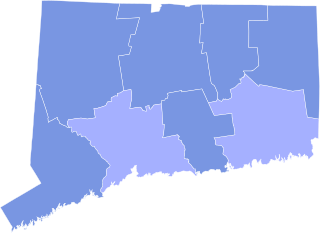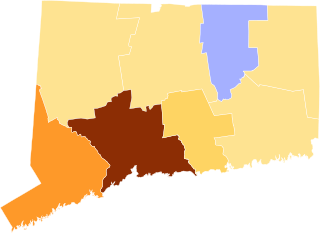
Presidential elections were held in the United States from November 3 to December 7, 1836. Incumbent Vice President Martin Van Buren, candidate of the Democratic Party, defeated four candidates fielded by the nascent Whig Party.

Presidential elections were held in the United States from October 30 to December 2, 1840. In the shadow of an incomplete economic recovery from the Panic of 1837, Whig nominee William Henry Harrison defeated incumbent President Martin Van Buren of the Democratic Party. The election marked the first of two Whig victories in presidential elections, but was the only one where they won a majority of the popular vote. This was also the third rematch in American history.

Since Connecticut became a U.S. state in 1788, it has sent congressional delegations to the United States Senate and United States House of Representatives, beginning with the 1st United States Congress in 1789. Each state elects two senators to serve for six years in general elections, with their re-election staggered. Prior to the ratification of the Seventeenth Amendment in 1913, senators were elected by the Connecticut General Assembly. Each state elects varying numbers of members of the House, depending on population, to two-year terms. Connecticut has sent five members to the House in each congressional delegation since the 2000 United States Census.

The 1838–39 United States House of Representatives elections were held on various dates in various states between July 2, 1838, and November 5, 1839. Each state set its own date for its elections to the House of Representatives before the first session of the 26th United States Congress convened on December 2, 1839. They occurred during President Martin Van Buren's term. Elections were held for all 242 seats, representing 26 states.

The 1844 Chicago mayoral elections is the first of only two instances in which a Chicago mayoral election was declared invalid.

The 1855 Connecticut gubernatorial election was held on April 2, 1855. Former state legislator and American Party nominee William T. Minor defeated former congressman and Democratic nominee Samuel Ingham and incumbent governor and Whig nominee Henry Dutton with 43.51% of the vote.

The 1854 Connecticut gubernatorial election was held on April 3, 1854. Former state legislator and Whig Party nominee Henry Dutton defeated former congressman and Democratic nominee Samuel Ingham and former congressman Charles Chapman with 31.89% of the vote.

The 1853 Connecticut gubernatorial election was held on April 4, 1853. Incumbent governor and Democratic Party nominee Thomas H. Seymour defeated former state legislator and Whig nominee Henry Dutton and former state legislator and Free Soil nominee Francis Gillette with 51.01% of the vote.

The 1842 Connecticut gubernatorial election was held on April 4, 1842. Former Speaker of the Connecticut House of Representatives and Democratic nominee Chauncey Fitch Cleveland was elected, defeating incumbent governor and Whig nominee William W. Ellsworth with 49.94% of the vote.

The 1841 Connecticut gubernatorial election was held on April 5, 1841. Incumbent governor and Whig nominee William W. Ellsworth was re-elected, defeating businessman and Democratic nominee Francis H. Nicoll with 55.79% of the vote.

The 1840 Connecticut gubernatorial election was held on April 6, 1840. It was a rematch of the 1839 Connecticut gubernatorial election. Incumbent governor and Whig nominee William W. Ellsworth was re-elected, defeating former senator and Democratic nominee John M. Niles with 54.17% of the vote.

The 1839 Connecticut gubernatorial election was held on April 1, 1839. Incumbent governor and Whig nominee William W. Ellsworth was re-elected, defeating former senator and Democratic nominee John M. Niles with 51.52% of the vote.

The 1838 Connecticut gubernatorial election was held on April 2, 1838. Former congressman and Whig nominee William W. Ellsworth was elected, defeating former speaker of the Connecticut House of Representatives and Democratic nominee Seth Preston Beers with 54.14% of the vote.

The 1836 Connecticut gubernatorial election was held on April 4, 1836. Incumbent governor and Democratic nominee Henry W. Edwards was re-elected, defeating former governor, senator and Whig nominee Gideon Tomlinson with 53.93% of the vote.

The 1835 Connecticut gubernatorial election was held on April 6, 1835. It was a rematch of the 1834 Connecticut gubernatorial election. Former governor, senator and Democratic nominee Henry W. Edwards was elected, defeating incumbent governor and Whig nominee Samuel A. Foot with 52.13% of the vote.

The 1834 Connecticut gubernatorial election was held on April 7, 1834. Former senator and Whig nominee Samuel A. Foot was elected, defeating incumbent governor and Democratic nominee Henry W. Edwards with 49.83% of the vote.

The 1833 Connecticut gubernatorial election was held on April 1, 1833. Former senator and Democratic nominee Henry W. Edwards was elected, defeating incumbent governor and National Republican nominee John S. Peters with 41.31% of the vote.

The 1840 Massachusetts gubernatorial election was held on November 9.

The 1838 Massachusetts gubernatorial election was held on November 12.

The 1837 Massachusetts gubernatorial election was held on November 13.























